Current Treatment of Mental Illness Is Often Harmful
(Sylvia Engdahl's background information for her novel Stewards of the Flame)
BACKGROUND ON CONTROVERSIAL
TOPICS DEALT WITH IN
STEWARDS OF THE FLAME
Truer than you may realize
Worse than you may know
Harmful psychiatric care
It may seem incredible that this terrible abuse of the members of society deemed weakest could continue into an era when we travel between the stars. This story is, of course, unrealistically close to today in many respects, because I intentionally write for today's readers in such a way that they will identify with the characters. But I think that given the fundamental premise of the novel -- the total control of society by a medical establishment that focuses wholly on the physical aspect of being human -- it really is inevitable that psychiatry would not have progressed. After all, to me and to many others it's incredible that such abuse goes on here and now. The public at large refuses to believe it. Most people assume, because they want to assume, that psychiatrists with medical degrees must know what's best for their patients, and that even the mentally ill who "don't know they're sick" will benefit from the medication they are usually reluctant to take. This is a prime example of the mentality that favors imposition of unwanted care on the helpless "for their own good," and the reason why I fear that my fictional extension of the principle to all health issues is not at all unreasonable. Today it's the mentally ill who are victimized by well-meant coercion; tomorrow it may be all of us.

That said, I should point out that I am not "anti-psychiatry" in the sense of advocating the abolition of the entire profession, as are some today, such as the Church of Scientology (with which most critics of psychiatry have no connection whatsoever) as well as many patients who have suffered harm. One of the heroes of Stewards of the Flame is a psychiatrist, and so is one of the main characters in my trilogy Children of the Star. A small minority of practicing psychiatrists are well aware of the fallacies of the field's dominant theories and provide invaluable help to patients truly in need of it. What I oppose is first, the prevalent notion that all mental health problems are biologically based and result from chemical imbalance in the brain; second, the labeling of every sort of human dissatisfaction or deviation from average as an "illness"; and last but not least, compulsory treatment in any form -- which I believe is never warranted except where necessary to protect others from violence.
There is no point in taking space here to say what's wrong with psychiatric treatment for the sake of readers who may not know, since the links and books that follow make it appallingly clear. Nor do I have any hope that public awareness can alter today's psychiatric dogma. The public could, however, force abandonment of the most damaging treatments that are currently employed. It could and should insist that electroshock -- ECT, or electroconvulsive "therapy" -- be outlawed. As one blogger expressed it, "The forced application of ECT to millions of people ranks alongside the worst atrocities of the twentieth century," and this applies equally to the twenty-first. In my opinion there is absolutely no justification for allowing this horrific practice to continue. The surest way of stopping it, short of laws that would take time to get passed, would be to ban the use of federal funds for it -- are you really comfortable with the thought that your taxes are now being spent to intentionally inflict brain damage on innocent people?
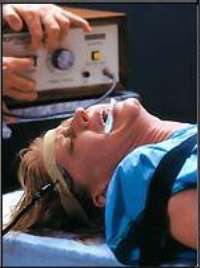
A recent lawsuit has forced even a manufacturer of ECT equipment to admit, and warn, that it can cause brain damage. Advocates claim that opponents have merely been upset by old movie portrayals of its use on conscious patients, but it's generally known that today anesthetics and muscle relaxants prevent suffering during the treatment. That is not an issue. The appalling thing is what happens to the patient afterward. It's said that ECT "works" for relieving depression, and no doubt it does -- it's hardly surprising if people become temporarily less depressed when they lose the memory of what was depresing them and/or their pattern of dark thoughts is disrupted. But depression is not the worst that can happen to a person. Losing the ability to think clearly is more devastating, and so is losing good memories along with the bad. In some cases a whole lifetime of memories is lost, as is the knowledge and skill essential to continuing in a profession and even the ability to learn. Lives have been ruined, and there have been more than a few suicides. Though some people consent to undergo ECT voluntarily, either they are not warned or they are too sick to make an informed choice. The rest are subjected to it by force, which is no more excusable than the infliction of any other form of torture.
As for psychiatric drugs, some are as damaging as ECT; others cause considerable suffering, both mental and physical; and still others are seemingly harmless and are taken regularly by millions of people, including children, of whom only a few have problems serious enough to warrant it. Since they are all relatively new in terms of a human lifespan, no one knows what the long-term effects of medicating a significant percentage of the population will be (although science fiction such as Brave New World has imagined them). It is known that many drugs are addictive and that a few occasionally lead to violent behavior or suicide, especially on the part of young people.
If someone is truly suffering -- in his or her own view and not just that of observers -- then I think a psychoactive drug that helps is justifiable, so long as it is taken voluntarily. I see no justification for involuntary psychiatric hospitalization and/or treatment except in the case of violent patients who pose a danger to others. This could be stopped by public pressure, but I suppose willingness to tolerate unseemly behavior on the part of people who are "different" is too much to expect from the public. Attempts to free them have resulted in complaints that it leads to an increase in the number of homeless street people, which is true; but surely there is a better way to deal with homelessness than incarcerating those who can be labeled "sick" and therefore not entitled to basic human rights. At the very least, let's not cling to the illusion that such persons are "better off" if imprisoned or drugged into compliance with society's norms. Let's recognize that forced treatment of the mentally ill serves our convenience, not their welfare, and think very carefully about what precedent we are setting with respect to our own freedom of choice.
Some links to criticism of current psychiatric treatments.
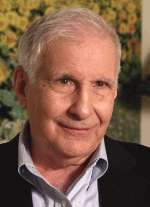 Peter Breggin |
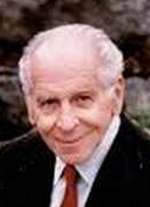 Thomas Szasz |
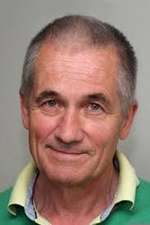 Peter Gøtzsche |
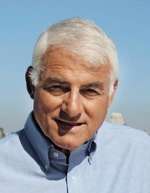 Allen Frances |
 Joanna Moncrieff |
 Robert Whitaker |
Thomas S. Szasz Cybercenter for Liberty and Responsibility, a site dedicated to the life and work of Dr. Thomas Szasz (now deceased), the best-known critic of the entire concept of "mental illness" and of government involvement in therapy. "We are opposed to institutional psychiatry and coercion. We are not opposed to contractual or consenual psychoanalysis, psychotherapy, or counseling, what have you, as long as the designated client is able to fire his or her therapist at any time."
Mad in America, a site designed to serve as a resource and a community for those interested in rethinking psychiatric care in the United States and abroad. Its bloggers include people with lived experience, peer specialists, psychiatrists, psychologists, social workers, program managers, social activists, attorneys, and journalists.
Abolishing Forced Treatment in Psychiatry is an Ethical Imperative by Peter Gøtzsche, M.D. Mad in America, June 17, 2016. "Forced treatment cannot be defended, neither on ethical, legal or scientific grounds. We need to abolish our laws about this, in accordance with the United Nations Convention on the Rights of Persons with Disabilities."
Forced “Treatment” Is Torture by Peter Breggin. Mad in America, June 19, 2016. "The neuroleptic drugs cause a confusing combination of emotional numbing and apathy along with feelings of acute physical discomfort and agonizing akathisia and agitation; but they inevitably produce docility with a chemically lobotomizing disruption of the brain."
The Double Standard of Forced Treatment by John M. Grohol. PsychCentral, July 8, 2018. " If an oncologist can’t force a cancer patient to undergo life-saving chemotherapy, there’s little that can justify our use of this type of power in psychiatry and mental health."
Putting The Mind And Soul Back Into Psychiatry by Allen Frances. Huffington Post, December 2, 2014. "In recent years, psychiatry has embraced what a former president of the American Psychiatric Association has despairingly called a "bio/bio/bio" model. The enormous research budget of the National Institute Of Mental Health has been totally invested in biologically reductionist brain and genomic research."
Neutralising Suffering: How the Medicalisation of Distress Obliterates Meaning and Creates Profit by Joanna Moncrieff. Author's website, March 11, 2014. "The drug companies went about marketing the serotonin theory of depression, sweeping much of the psy professions along with them, with only a few lonesome voices belatedly pointing out that the emperor had no clothes."
Drug Company Dominance Makes Some Shrinks Very Rich, and Many Patients Over Drugged by Bruce E. Levine. AlterNet, April 15, 2014. "When Big Pharma is paying thought leader psychiatrists . . . and when most psychiatrists are only conducting medication managements, tragically insane treatments become the 'standard of care.'"
A Call to Arms: The Future of Psychiatry is at Stake By Robert Berezin, M.D. Mad in America, January 12, 2015. "The chemical imbalance theory of somatic psychiatry has almost completely replaced a genuine understanding of human struggle."
Psychiatric Drugs: An Assault on the Human Condition by Terry Messman. Street Spirit (a publication of the American Friends Service Committee), August 2005. (Interview with Robert Whitaker, author of Mad in America; see also Messman's review of the book in the same issue.) "The real tragedy is, that even as we peddle these drugs as chemical balancers, chemical fixers, in truth we're doing precisely the opposite. We're taking a brain that has no known abnormal brain chemistry, and by placing people on the drugs, we're perturbing that normal chemistry."
Madness and the Mental Health System by David Oaks. Alternatives. June 2006. "The mental health system is now targeting the general public -- especially youth through 'screening programs' -- for inappropriate and sometimes brain damaging psychiatric drugging without adequate informed consent, advocacy or alternatives."
Towards a New Psychiatry: Say ‘No’ to the Fiction of Brain Diseases by Robert Berezin. Mad in America, March 30, 2015. "During my lifetime I have witnessed the fall of Freudian psychiatry and the ascension of molecular psychiatry. Unfortunately, we have gone from the frying pan into the fire."
Smashing the Biological Anxiety Myth by Robert Berezin. Psychology Today, March 1, 2016. "The very idea that a pill can actually address the profound issues of the human psyche is an embarrassment on the face of it. The reason there is no evidence that human problems come from neurotransmitters and genetic defects is because it’s not true."
The "Chemical Imbalance" Myth by Chris Kesser. Author's website, February 10, 2019. "Psychiatrists became increasingly aware of growing competition from nonmedical therapists such as psychologists, social workers and counselors. Because of this, psychiatrists have been attracted to physical treatments like drugs and electroshock therapy that differentiate them from nonmedical practitioners."
The Real Problems of Psychiatry by Hope Reese (interview with psychotherapist Gary Greenberg). The Atlantic, May 2m 2013. "Every doctor who knows anything knows that there is no biochemical imbalance that causes depression, and most doctors understand that a diagnosis of depression doesn't really tell you anything other than what you already knew."
The Challenge of Going Off Psychiatric Drugs by Rachel Aviv. The New Yorker, April 1, 2019. "In the course of a year, her doctors had created what’s known as 'a prescription cascade': the side effects of one medication are diagnosed as symptoms of another condition, leading to a succession of new prescriptions."
FDA Approves Using Electricity All Night Long on Children’s Brains by Michael Cornwall. Mad in America, May 21, 2019. "When I read of this latest human rights assault on our helpless to resist, totally vulnerable and dependent minor children by the FDA, psychiatry, NAMI and big business, I had that awful kind of emotional reaction of feeling both like crying and punching a hole in the wall at the same time."
ECT Resources Center maintained by Dr. Peter Breggin, with links to many scientific articles. "ECT works by damaging the brain. The initial trauma can cause an artificial euphoria which ECT doctors mistakenly call an improvement. . . . Abundant evidence indicates that ECT should be banned. Because ECT destroys the ability to protest, all ECT quickly becomes involuntary and thus inherently abusive and a human rights violation."
Disturbing News for Patients and Shock Doctors Alike by Dr. Peter Breggin. Huffington Post, Updated May 25, 2011. "A team of investigators has recently published a follow up study of 347 patients given the currently available methods of electroshock, including the supposedly most benign forms -- and confirmed that electroshock causes permanent brain damage and dysfunction."
Testimony of John M. Friedberg, M.D., Neurologist, before the New York State Assembly, May 18, 2001. "To be held down, drugged and forcibly administered convulsive dose after convulsive dose of electroshock to the head: can anyone think of a greater assault on a human being's rights -- short of death -- in the whole world?"
Testimony of Linda Andre, Director of Committee for Truth in Psychiatry, before the New York State Assembly, May 18, 2001. "In the early decades of ECT, doctors were frank about sacrificing the brains, intellects, and careers of their patients in the hope of a temporary respite from depression. Since about 1975, the beginning of what I call the public relations era of ECT . . . they have attempted to deny or cover up memory loss and brain damage."
Psychiatry's Electroconvulsive Shock Treatment, a Crime Against Humanity by Lawrence Stevens, an attorney. "Other than by causing mental disorientation and memory loss, ECT does not help eliminate the unhappy feeling called depression.... Indeed, rather than eliminating depression, the memory loss and lost mental ability caused by ECT has caused some subjected to ECT so much anguish they have committed suicide after receiving the 'treatment.'"
Electroshock Must Be Banned as Crime Against Humanity by Don Weitz. Street Spirit (a publication of the American Friends Service Committee), August 2005. "I refuse to call electroshock a treatment. Why? Because this allegedly 'safe, effective and lifesaving treatment' for depression and other so-called 'mental disorders' always causes brain damage, permanent memory loss, terror, trauma, and sometimes death."
ECT Device Manufacturer Issues New Warning of "Permanent Brain Damage by DK Law Group. Mad in America November 15, 2018. "Somatics LLC’s new disclosure would appear to take the legal force away from their claim that brain damage doesn’t occur from ECT, and winning medical malpractice cases over failure to give informed consent seems to me to be much more of a possibility."
ECT Justice! A site for survivors of ECT containing survivor stories as well as links to other articles and videos.
PsychRights, a nonprofit public-interest law firm whose mission is to mount a strategic litigation campaign against forced psychiatric drugging and electroshock in the United States. Its website has many patient stories of damaging psychiatric treatment and links to articles elsewhere on the Web.
Center for the Human Rights of Users and Survivors of Psychiatry. "CHRUSP works for full legal capacity for all, an end to forced drugging, forced electroshock and psychiatric incarceration, and for support that respects individual integrity and free will."
Mindfreedom International, a leading organizer of activism in mental health. It is "an independent nonprofit that unites 100 grassroots groups and thousands of members to peacefully take action for human rights in the mental health system.... A majority of our members identify themselves as 'psychiatric survivors.'"
Antipsychiatry Coalition, a nonprofit volunteer group consisting of people who feel they have been harmed by psychiatry, and their supporters. This group favors the abolition of psychiatry as a medical specialty, arguing that people with real brain disease should be treated by neurologists and that most mental health problems are better dealt with by psychotherapists without medical training.
Citizens Commission on Human Rights (CCHR), a major organization dedicated to investigating and exposing psychiatric violations of human rights. It is affiliated with the Church of Scientology, which is noted for its opposition to psychiatry but has its own coercive agenda; and as scientology is no way endorsed by other critics of current psychiatric treatment methods, they are careful to disassociate themselves from it.
Akathisia (Wikipedia article). This is a common and extremely distressing effect of psychiatric drugs; the reference is included here because it is mentioned, though not named, in Stewards of the Flame. There are reports that the Nazis and Soviets used such drugs to induce it as a form of torture. Milder forms are now known to occasionally occur even with common antidepressants
Some books critical of biologically-based psychiatry and psychoactive drugs.
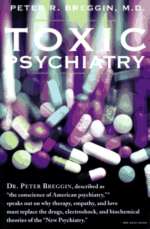 |
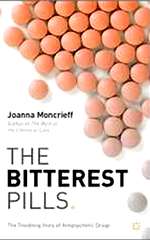 |
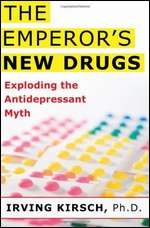 |
 |
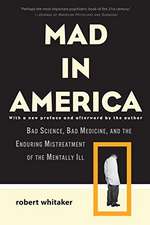 |
 |
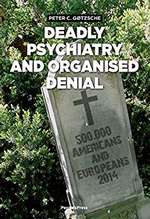 |
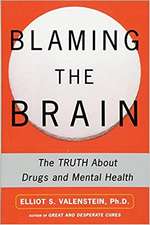 |
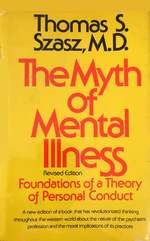 |
Comfortably Numb: How Psychiatry Is Medicating a Nation by Charles Barber. Vintage, 2009.
Psychotherapy of Character: The Play of Consciousness in the Theater of the Brain by Robert A. Berezin, M.D. Wheatmark, 2013.
Brain Disabling Treatments in Psychiatry bby Peter R. Breggin, Springer, 2007. (This is an expensive medical textbook but the introduction, available online as a Kindle free sample, is worth reading.)
Medication Madness: True Stories of Mayhem, Murder, and Suicide Caused by Psychiatric Drugs by Peter R. Breggin. St. Martin's, 2008.
Talking Back To Prozac: What Doctors Aren't Telling You About Today's Most Controversial Drug by Peter R. Breggin. St. Martin's, 1995.
Talking Back to Ritalin: What Doctors Aren't Telling You About Stimulants and ADHD by Peter R. Breggin. Da Capo, 2001.
Toxic Psychiatry: Why Therapy, Empathy and Love Must Replace the Drugs, Electroshock, and Biochemical Theories of the "New Psychiatry" by Peter R. Breggin. St. Martin's, 1994.
They Say You're Crazy: How the World's Most Powerful Psychiatrists Decide Who's Normal by Paula J. Caplan. Addison Wesley, 1996.
Cracked: The Unhappy Truth about Psychiatry by James Davies. Pegasus, 2013.
The Spiritual Gift of Madness: The Failure of Psychiatry and the Rise of the Mad Pride Movement by Seth Farber. Inner Traditions, 2012.
Saving Normal: An Insider's Revolt against Out-of-Control Psychiatric Diagnosis, DSM-5, Big Pharma, and the Medicalization of Ordinary Life by Allen Frances. Morrow, 2013.
Warning: Psychiatry Can Be Hazardous to Your Mental Health by William Glasser. Harper Quill, 2004.
Deadly Medicines and Organised Crime: How Big Pharma Has Corrupted Healthcare by Peter C. Gøtzsche. CRC Press, 2013.
Deadly Psychiatry and Organised Denial by Peter C. Gøtzsche. ArtPeople, 2015.
The Book of Woe: The DSM and the Unmaking of Psychiatry by Gary Greenberg. Penguin, 2013.
Manufacturing Depression: The Secret History of a Modern Disease by Gary Greenberg. Simon & Schuster, 2010.
Spiritual Emergency by Stanislav and Christina Grof. Tarcher, 1989.
Let Them Eat Prozac: The Unhealthy Relationship between the Pharmaceutical Industry and Depression by David Healy. New York University Press, 2004.
All We Have to Fear: Psychiatry's Transformation of Natural Anxieties into Mental Disorders by Alan V. Horwitz and Jerome C. Wakefield. Oxford University Press, 2012.
The Loss of Sadness: How Psychiatry Transformed Normal Sorrow into Depressive Disorder by Alan V. Horwitz and Jerome C. Wakefield. Oxford University Press, 2012.
Rethinking Psychiatric Drugs: A Guide for Informed Consent by Grace Jackson. AuthorHouse, 2005.
Mad Science: Psychiatric Coercion, Diagnosis, and Drugs by Stuart A. Kirk, Tomi Gomory and David Cohen. Transaction Publishers, 2013.
The Emperor's New Drugs: Exploding the Antidepressant Myth by Irving Kirsch. Basic Books, 2010.
The Bitterest Pills: The Troubling Story of Antipsychotic Drugs by Joanna Moncrieff. Palgrave Macmillan, 2013
The Myth of the Chemical Cure: A Critique of Psychiatric Drug Treatment by Joanna Moncrieff. Palgrave Macmillan, 2009.
De-Medicalizing Misery: Psychiatry, Psychology and the Human Condition by Joanna Moncrieff and Mark Rapley, eds. Palgrave Macmillan, 2011.
Crazy in America: The Hidden Tragedy of Our Criminalized Mentally Ill by Mary Beth Pheiffer. Basic Books, 2009.
Bedlam: Greed, Profiteering, and Fraud in a Mental Health System Gone Crazy by Joe Sharkey. St. Martin's, 1994.
Coercion as Cure: A Critical History of Psychiatry by Thomas Szasz. Transaction Publishers, 2009.
The Manufacture of Madness: A Comparative Study of the Inquisition and the Mental Health Movement by Thomas Szasz. Syracuse University Press, 1997 (1970).
The Medicalization of Everyday Life: Selected Essays by Thomas Szasz. Syracuse University Press, 2007.
The Myth of Mental Illness by Thomas Szasz, Harper Perennial, 2010 (1974).
Pharmacracy: Medicine and Politics in America by Thomas Szasz. Prager, 2001.
Schizophrenia: The Sacred Symbol of Psychiatry by Thomas Szasz. Syracuse University Press, 1988.
Blaming the Brain: The Truth About Drugs and Mental Health by Elliot Valenstein. Free Press, 2002.
Anatomy of an Epidemic: Magic Bullets, Psychiatric Drugs, and the Astonishing Rise of Mental Illness in America by Robert Whitaker. Crown, 2010.
Mad In America: Bad Science, Bad Medicine, and the Enduring Mistreatment of the Mentally Ill by Robert Whitaker. Perseus, 2003.
Rethinking Madness: Towards a Paradigm Shift in Our Understanding and Treatment of Psychosis by Paris Williams. Sky's Edge Publishing, 2012.
Use of Implants to Treat Alcoholism
I imagined such implants in 1989 when I began the first draft of the story that became Stewards of the Flame, only to find (in 2007) that reality had long ago caught up with even my most drastic speculation. Here's a quote from The Guardian (UK), July 17, 2003: "The implants act only as a deterrent. 'They are purely a chemical terror-based medication,' says Dr. Kris Zakrzewski, a private consultant who has fitted the implants in hundreds of patients. 'They work on the assumption that people know if they drink they would have some pretty violent physical effects.' But the effects differ from patient to patient and Zakrzewski says up to half of all patients experiment with alcohol, to see what they can get away with.... The implants are fitted under the skin of the abdomen, directly above the stomach. They release a steady amount of a chemical called disulfiram, which interferes with the way alcohol breaks down in the body. Alcohol usually oxidises all the way to carbon dioxide and water, but disulfiram blocks this reaction, causing a poisonous intermediate called acetaldehyde to build up. With even small amounts of alcohol this can cause headaches and vomiting; more severe reactions can lead to heart failure, coma and even death."Now, in 2019, when I Google "implants" and "alcoholism" I get 598,000 hits.
Last updated in June 2019
Text copyright 2019 by Sylvia Engdahl
This series of pages about background for Stewards of the Flame is not meant to be a comprehensive or balanced overview of the topics covered; it merely offers support for the ideas expressed in the novel.
BACKGROUND ON CONTROVERSIAL
TOPICS DEALT WITH IN
STEWARDS OF THE FLAME
Truer than you may realize
Worse than you may know
Harmful psychiatric care